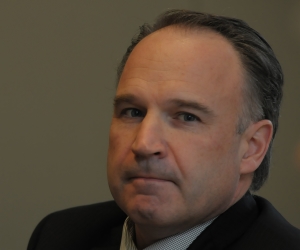Editor's note: This week's coverage of our U.S. equity roundtable begins today with the managers putting into perspective the current market weakness and negative investor sentiment.
Our panellists:
Jim Young, vice-president at Invesco Canada Ltd. He is responsible for Trimark U.S. Companies and Trimark U.S. Companies Class.
Glenn Fortin, portfolio manager at Beutel Goodman & Co. Ltd. Fortin is a U.S. equity specialist and a member of the firm's global equity team. The team's mandates include Beutel Goodman American Equity.
Michael Mattioli, managing director and portfolio manager at Boston-based Manulife Asset Management (U.S.), LLC. He is a member of the U.S. core-value equity team. The team's mandates include Manulife U.S. All Cap Equity.
Stephen Groff, principal and portfolio manager at Cambridge Global Asset Management, a unit of CI Investments Inc. Groff's roles include lead portfolio manager of CI Cambridge U.S. Dividend and CI Cambridge American Equity.
The roundtable was convened and moderated by Morningstar columnist Sonita Horvitch, whose three-part series continues on Wednesday and concludes on Friday.
Q: The U.S. equity market, as measured by the S&P 500 Index, produced a total return of -0.7% in the 12 months to the end of January. January was a weak month with a negative total return of 5%.
Young: It's been a tough start to the year. There's a negative feedback loop under way, driven largely by energy prices, a high U.S. dollar and China. It's a tough environment. There appears to be a modest recession in the U.S. industrial sector. Consumers still seem to be doing all right, although they have been selective in their spending and have focused on houses and cars. The rapid rate of change in the fundamentals of some sectors is making it hard for investors to evaluate the business models of some companies. There's also a trend to commoditize products quickly, which is another challenge. On the plus side, company balance sheets are good. Innovation is happening quickly and those companies that are innovating are benefitting from it. Despite the challenges, I think the weakness in the U.S. equity market is a pause rather than the start of a bear market. At some point, investors will start to focus on the positives.
 |
|
 |
|
| Glenn Fortin | |
 |
|
 |
|
 |
Fortin: About a year ago, we were at highs in the U.S. equity market and valuations had become stretched, almost across the board. As the summer unfolded, there were concerns about China's economy. Toward the end of the year, the outlook for the U.S. economy seemed to be less promising. There was the added distraction about the actions of the U.S. Federal Reserve Board. We got a federal-funds rate hike in December. Now, as we sit here today, the economies outside of the United States are not doing well, and there are concerns about the U.S. economy. There is this preoccupation with the Fed. We have gone from a consensus of four possible increases in the federal funds rate this year, down to maybe one.
Groff: Investors spend far too much time worrying about 25 basis points rather than focusing on companies, management teams and their capital allocation. This is our focus.
Fortin: Last year, the U.S. equity market was characterized by the focus on momentum stocks, which did extremely well. These are the famous FANGs. This is the acronym for ![]() Facebook Inc. (FB),
Facebook Inc. (FB), ![]() Amazon.com, Inc. (AMZN),
Amazon.com, Inc. (AMZN), ![]() Netflix Inc. (NFLX) and the two share classes of
Netflix Inc. (NFLX) and the two share classes of ![]() Alphabet Inc. (GOOG) and (GOOGL), the parent company of Google. Last year, the momentum/growth indexes did well, while the value index was relatively weak. There was a significant spread between their performances. Things can change quickly. We're seeing this year-to-date. It could be the beginning of the momentum market tipping over.
Alphabet Inc. (GOOG) and (GOOGL), the parent company of Google. Last year, the momentum/growth indexes did well, while the value index was relatively weak. There was a significant spread between their performances. Things can change quickly. We're seeing this year-to-date. It could be the beginning of the momentum market tipping over.
Young: Investors are taking money out of their winners. These stocks have rolled over big time.
Fortin: The FANGs are getting defanged.
Groff: The market has gone from risk on to risk off. Recently, ![]() LinkedIn Corp. (LNKD) declined more than 40% in one day. The momentum has carried many of these stocks to very high valuations. They never should have been at these levels in the first place.
LinkedIn Corp. (LNKD) declined more than 40% in one day. The momentum has carried many of these stocks to very high valuations. They never should have been at these levels in the first place.
 |
|
 |
|
| Stephen Groff and Michael Mattioli | |
 |
|
 |
|
 |
Mattioli: We're finding a lot of bright spots in the U.S. economy. Look at the health of the U.S. consumer. Balance sheets are very much deleveraged. There is a benefit from a lower oil price to the consumer. There are concerns that this is not showing up in consumer spending. Our thought is that a lot of that benefit has gone into consumer deleveraging. In the job market, you're starting to see an increase in average hourly earnings, which should improve labour-force participation. Energy exploration and production companies and companies connected to them are having some balance-sheet issues. But for the consumer, the steep decline in the oil price is a good thing.
Young: Their most important asset is going up. House prices are going up. This is a nice tailwind.
Mattioli: Every one million homes built creates four million permanent new jobs. In all, we're quite optimistic about the fundamentals. How they relate to what the businesses are ultimately worth and, more importantly, what the market is willing to pay for this, is the question. These two don't always connect in the short term.
Q: Surely, if there is so much doom and gloom and the fundamentals, in some cases, are superior to valuations, this creates opportunities?
Fortin: Some statistics measuring the bullish sentiment level, suggest that we are at the lowest level in 25 plus years. It speaks to the uncertainty among investors.
Young: You can see this in mutual-fund redemptions.
Fortin: The market is sensitive to any near-term hiccups at companies. The case of LinkedIn is a little extreme, but so many companies are seeing their stocks down 20% in a day on news that is not necessarily reflective of their long-term business fundamentals. As a value manager, this is where we often find the greatest opportunities.
Young: We focus on innovation, but being a growth-at-a-reasonable-price investor, we don't pay just anything for this. Investors sometimes miss how fast science is advancing and how quickly ideas are being commercialized. In the United States, there's a large venture-capital industry looking for ideas, a lot of which are coming out of the universities.
Q: An example is Facebook.
Young: Innovation is an important engine of growth and it tends to be unique to the United States. The technologically advanced industries create high-value-added jobs and high-value-added products with good margins. Companies reinvest in the business, which keeps it all going. I've taken my health-care weighting up a fair bit. I'm also seeing a lot of opportunities in technology.
Q: Please summarize your thoughts on valuations in the U.S. equity market.
Fortin: The energy and materials companies are trading at financial-crisis valuations. Industrials and other companies that are connected to them are also under pressure.
 |
|
 |
|
| Jim Young | |
 |
|
 |
|
 |
Young: The banks are very cheap. They are suffering.
Mattioli: If investors are fearful of a recession, they extrapolate from what happened in the most recent crisis and recession. Coming out of the global financial crisis in 2008-2009, investors saw what happened to the banks. The market is pricing bank stocks as if this will be repeated. But when you look at banks' balance sheets, their liquidity levels and the stringent stress tests that they're subjected to every year, they're on a strong footing. Yet, a bank like ![]() Citigroup, Inc. (C) is trading at 60% of tangible book value.
Citigroup, Inc. (C) is trading at 60% of tangible book value.
Young: Investors are worried about bank loan losses in the energy sector. As things slowed down in January, investors gave up on the interest-rate increase, so the thought is that banks' net interest margins are not going to improve.
Mattioli: The big banks have a minuscule amount of energy loans.
Young: Their loan-loss reserves are great.
Mattioli: The equity market is decidedly in a risk-off approach. The large banks are collectively trading at a price/earnings multiple on forward earnings estimates that represents a big discount to the multiple on the market as a whole.
Groff: An interesting perspective on the sentiment surrounding the U.S. equity market is to look at what's happened in the U.S. corporate-bond market. A little over a year ago, if you looked at the conditions and pricing under which companies could raise money and compared that to today's conditions and pricing, it's night and day. It was easy and low cost for companies to raise money a year ago. Now some of the companies are shut out. That same change in sentiment is affecting the U.S. equity market.
Young: Just like we experienced irrational exuberance in 1999 and 2000, we can have irrational despondency for a while.
Photos: Paul Lawrence Photography



















